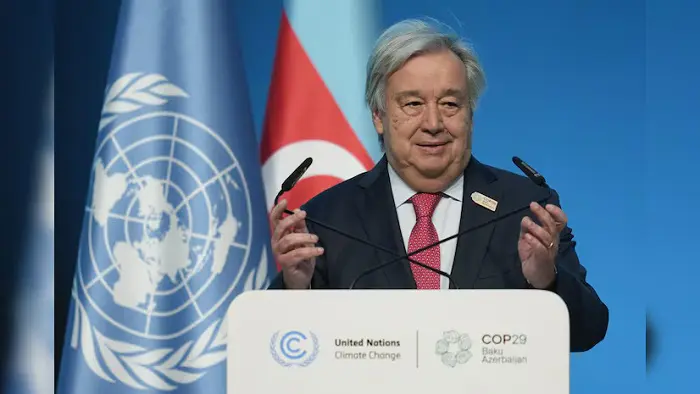Olusegun Ariyo
The UN Secretary-General, Antonio Guterres, has said that the UN is assisting nearly 100 developing countries with their climate action plans ahead of the pivotal COP30 in Brazil later this year.
The 2025 UN Climate Change Conference (COP30) will be held in Brazil from Nov 10 to 21, 2025.
Guterres said this in New York in his traditional New Year address to the General Assembly.
He promised a special stocktaking event to keep the 1.5℃ target within reach.
Referencing the infernos engulfing the canyons of Los Angeles, the UN chief said everyday people worldwide are suffering the deadly effects of a warming planet and extreme weather.
But here too, there is a huge opportunity to reverse the damage and build on climate action such as renewable energy growth, a commitment to net zero and national plans to cut emissions.
The UN chief underscored positive developments in climate action that reflect the commitment of the United Nations to combating global warming, as the world now invests almost twice as much in clean energy as it does in fossil fuels.
Also a measure of how much socio-economic progress has been made in line with UN values, Guterres noted that “in much of the world, girls have achieved parity in education.
On health matters, moreover, “more children are surviving today than ever before,” he insisted, before adding that HIV infections “continue to dramatically decline, along with malaria mortality rates”.
He described the UN as “a force of construction” that always strengthens how it works and delivers, proving that global problems need global solutions.
But there can be no illusions that action or inaction has “unleashed a modern-day Pandora’s Box of ills,” he continued, highlighting protracted wars, inequality, the climate crisis and “out of control technology.”
Guterres, however, called for negotiators reportedly close to a deal on a Gaza ceasefire to finalise the deal. Throughout the whole Middle East “we must deny extremists a veto over a peaceful future,” he said.
He announced he would travel to Lebanon later in the day, emboldened by the positive developments there in recent weeks that could see Israelis and Lebanese forge a new and lasting era of peace and security.
The UN chief highlighted conflict in Ukraine, Sudan, the Sahel and Haiti.
“Inequalities can be beaten,” he said boldly, starting with accelerating progress on the Sustainable Development Goals (SDGs) through multilateral reform on all fronts.
He said the scourge of discrimination and hate speech was also fuelling inequality, demonstrating the need to strengthen “communities of belonging”:
“This is even more crucial as guardrails around social media platforms are being dismantled, allowing disinformation and hate speech to run rampant.
The secretary-general said the technology revolution in 2025 also offers “unprecedented opportunities” but needs careful stewardship and a commitment to equal access for all.
Rapid and decisive action must be taken across the UN to ensure a level playing field including the setting up of an Independent International Scientific Panel on AI – without delay.
the government of Artificial IntelligenceSecondly, the governance of Artificial Intelligence must protect human rights while also promoting innovation. Third, developing countries must be supported so AI can be leveraged for sustainable development, he said.
“Humanity’s hand must be firmly in control” of the tech revolution, he added, with every nation helping to shape AI to advance human progress, equality and dignity.
He further noted that the Pandora myth includes one often overlooked detail. After the box was opened unleashing its horrors, there was one thing left inside – hope.
“We must never lose sight of hope.
“And we will work to lift the lid on that hope through action. To make it real, to help it spread sticking to principles, speaking the truth, never giving up,” Guterres said.







